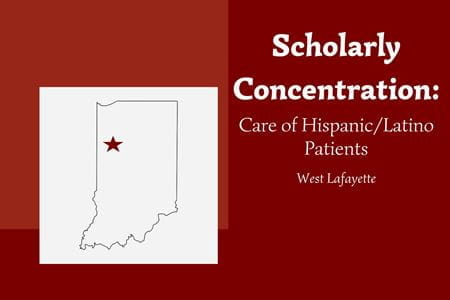In 2019, IU School of Medicine launched Scholarly Concentrations. To help students decide if a concentration topic is the right fit, concentration co-directors shared the inside scoop — from why they got involved in the concentration to how a specific topic can help students reach their goals.
Topic: Care of Hispanic and Latino Patients
Location: West Lafayette
Co-directors: Raymundo Munguia-Vazquez, MD, PhD and Cecilia Isabel Tenoria, MA
Introduce yourself. Who are you and briefly tell us about your experience with the concentration topic.
Ray Munguia-Vazquez, MD, PhD: I am a clinical assistant professor of otolaryngology-head and neck surgery at IU School of Medicine—West Lafayette and clinical assistant professor of speech language and hearing sciences at Purdue University. I consider myself a clinician-scientist, someone that has received extensive clinical and research training. As part of my role as the assistant director for enrichment opportunities at West Lafayette, I am always looking for ways to enhance our medical education by connecting our students with other departments, offering them unique experiences to each and every one of them. My interest comes from the fact I have experienced, firsthand, the different types of collaborations that can exist between both schools and departments, and, because I understand the importance of developing well-trained, clinician-scientists for the benefit of the population.
Cecilia Isabel Tenorio, MA: I am the director of the minor in Spanish for the Professions at Purdue University, where I have worked for over 20 years. I have designed and taught courses in medical Spanish, translation and interpreting, and advanced Spanish language and culture, among others. I am a nationally certified translator and legal interpreter. During my career, whether in Buenos Aires, México, New York, Miami or Indiana, I have been involved in education, journalism or consulting regarding the Spanish language and Spanish speaking communities. Through service learning projects, my students have volunteered at the Purdue health clinics, the YWCA domestic abuse program, health fairs and other endeavors that involved getting to know and interacting with the local Latino population. Besides my professional experience, I also have the life experience of growing up in Latin America, where I learned first-hand that science-based knowledge can coexist with traditional beliefs and practices. I became involved in this scholarly concentration because I am a firm believer in improving health care through better communication between the different sectors of the population. Learning another language and culture not only allows you to bridge the gap with a specific group, but also to question and reflect on your own beliefs and assumptions.
What are you most excited about in regard to scholarly concentrations and/or your concentration topic?
Munguia: My interest in this scholarly concentration comes from the fact that I identify myself as part of this minority group (i.e. Latino). Because I am in constant contact with this community, I understand the problems and limitations that they face in the clinical setting every day.
Tenorio: I love the Spanish language and the culture of the 20 countries that speak it and that constitute the heritage of the Hispanic population in the U.S. With so many dialects, cultures and national identities, there are endless topics for discussion and research. I have never stopped learning and I see the scholarly concentration on the care of Hispanic patients as an opportunity to share what I know, as much as to learn from our students and from members of the Hispanic community. I will provide options for students to work on their research projects, but I am also enthusiastic and open to new ideas that they will bring to the concentration. It will be an exciting journey!
What are the two or three most important or interesting things students should know about this concentration?
The main core of the Care of Hispanic/Latino Patients scholarly concentration program is to address three main components: cultural competency, special issues in communication, and medical Spanish fluency. We want to develop students’ listening and speaking abilities through the acquisition of specialized medical vocabulary and other concepts regarding patient communication.
How is this concentration beneficial to a student’s personal and professional goals?
Not only will students have the opportunity to practice their oral skills, but also learn about and discuss the demographic component, cultural background and health practices of the Hispanic population in the United States.
Some students may have a hard time deciding which concentration to choose. How can a student decide if this topic is the best fit for them?
The Care of Hispanic/Latino Patients scholarly concentration is a dynamic and engaging concentration. Students are required to complete courses onsite in West Lafayette, must have some skill in speaking Spanish, and have a strong desire to learn about and develop competency in providing care for Hispanic/Latino patient populations. Recitation sessions will be conducted in Spanish with a faculty member from the Department of Spanish and Portuguese in the School of Languages and Culture at Purdue University who specializes in Spanish for medical professionals. You can learn more about the specific courses on the concentration's web page.
